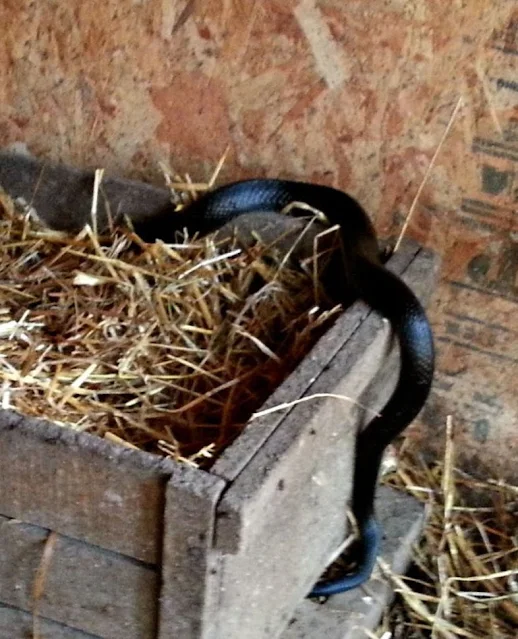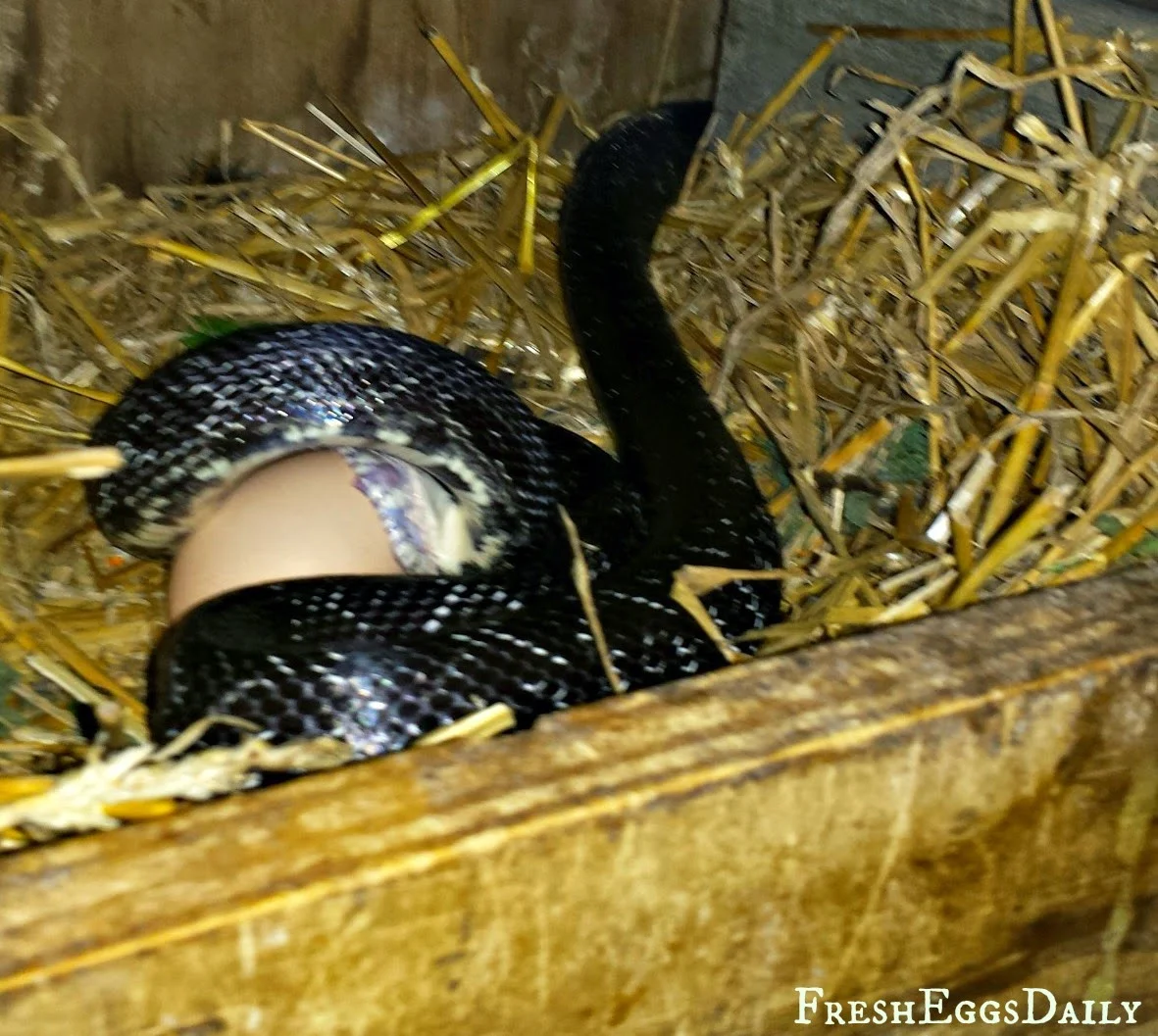9 Tips to Keep Snakes out of your Chicken Coop
Although there are many beneficial types of snakes that help to rid farms of rodents, snakes are often the bane of the backyard chicken keeper, as this photo above shared with me by Linda Germak illustrates.
Lured to the chicken coop area by the promise of an easy meal even non-venomous snakes can pose a real threat.
Snakes will eat eggs and small chicks, and larger types of snakes will sometimes even eat ducklings or sometimes bantams, as well as the mice drawn to the coop.
And many snakes, although not poisonous, are constrictors, and will squeeze larger birds to death.
Snakes can squeeze through the tiniest of cracks or smallest of spaces and therefore are very hard to keep out of a run or pen.
9 Tips to Keep Snakes out of your Chicken Coop
After our recent run-in with a black rat snake, I revised my snake defenses and wanted to share with you.
I got quite a scare one morning this past spring when I opened the duck house to find this black rat snake inside! Not what I expect (or want) to see when I let the ducks out in the morning.
The poor ducks scrambled out as fast as they could, unharmed, but visibly shaken.

Our sitting duck and her eggs didn't fare quite as well - the snake had eaten three of the ten Silver Appleyard duck hatching eggs right out from under her.
Needless to say, both I and the ducks were pretty traumatized.

How Snakes Get into Chicken Coops
Generally snakes will get caught when they squeeze in through a small hole, then eat something which then makes it impossible for them to squeeze back out.
In this case, it was clear the snake wasn't able to escape the duck house or pen after eating the eggs, but I was stumped as to how it got in in the first place.
Black rat snakes like the ones we had in our coop in Virginia will eat several eggs (or baby chicks) in one sitting, ingesting them whole.
Sometimes they will even try to constrict a small chicken or duck, squeezing it to kill it.
There are also copperhead snakes in Virginia that are venomous and can be deadly, but fortunately in over a decade living in the South, we only saw one - and a baby at that.
It wasn't until I set up my Trail Cam that I figured out how the snake got in. After looking at the photos on the trail cam and doing some hard thinking,
I did a bit of hard thinking that I realized the snake had merely slithered up the ramp in broad daylight and through the open front door of the duck house during the day then hidden in the straw until dark, undetected.
Keeping Snakes out of Poultry Pens
Our duck pen is constructed of 1/2" welded wire. All the vents in the duck house are covered with the same. Since the coop door was locked all night, the snake was unable to escape with its belly full of eggs, sot had to wait until morning when I opened up the pen.
After our snake visit, I went over the duck house and pen with a fine-tooth comb checking for a larger hole. There was none.
A snake this size can't get through an opening that small even with an empty belly. 1/2" welded wire on a pen or vent will keep out all but the smallest snakes and small field mice.
All about Black Rat Snakes
According to the Audubon Society Field Guide, Black Rat Snakes are found in nearly the entire mid-Atlantic region. This is the type of snake that we primarily have to deal with.
While technically the 'good guys', these rat snakes eat not only rats, mice and voles but also baby Copperheads which also live in this area. So that's one reason to try and leave the rat snakes alone, if at all possible.
While they will bite if provoked or cornered, they are non-venomous. They are constrictors, meaning they often will suffocate even prey that is too large to swallow and kill it in the process.
They can climb and swim...and pretty much will live anywhere - in the woods, under a board, by the roadside, inside an abandoned building.
One day last summer, I found a black rat snake wrapped around one of our full-grown Pekin ducks' bills, in the process of trying to wrap itself around the duck's neck to strangle it.
The duck had apparently tried to eat the snake tail first as the snake tried to constrict the duck. The duck couldn't open her bill because the snake was around it and the snake couldn't get away because the duck had swallowed half of it.
Fortunately I was able to unwind the snake from the duck's bill and extricate it from the duck's mouth and each went their separate way. These snakes definitely pose a potential threat.
So, bottom line, you don't want these guys hanging around inside your run or coop/duck house.
Sulfur sprinkled around the perimeter of your coop and run and/or a thick rope circling the perimeter are both non-lethal ways to keep snakes away and your chicks, chickens and eggs safe.
9 Tips to Help Repel Snakes
Here are some tips on making your coop area less desirable:
Note: moth balls are often recommended as a snake repellent but since they are poisonous, I do NOT recommend using moth balls around your flock or other animals. It is also actually illegal to use them outside at all.
I have been implementing these steps and although we've seen snakes in the vicinity of our run, we haven't seen any actually IN the run or duck house since spring.
I think the duck house is their more desirable destination since the duck nesting boxes are floor level, so easily accessible, as opposed to the coop where the boxes are up about four feet off the ground, but to be on the safe side, I ringed everything with the sulfur mix.
Since snakes often use the tunnels that field mice and rats dig to move around, search for rodents and hide in, often your first indication that there are mice and/or snakes lurking will be small quarter-sized holes around your coop area.
I sprinkled the sulfur mix around any mouse holes I found. I added a mint leaf or two to repel any mice as well.
Please Don't Put Golf Balls in your Chicken Coop
Some people suggest that leaving golf balls in the nesting boxes works to rid your coop of snakes. They eat the golf balls and subsequently die since they can't digest them.
Since the black rat snake is beneficial in many ways, that method, or otherwise killing them should be a last resort, but sometimes if the snake keeps coming back, killing it might be your only option if you don't want to lose your eggs and chicks. An easy meal is just too much of a draw for the snakes, sadly.
So far, the sulfur seems to be working well. It's perfectly safe to use around the chickens and I merely reapply it after a heavy rain.
I also use a rake to stir up the straw on the floor and also check the nesting boxes carefully each evening before closing up the coop and duck house to ensure I don't inadvertently lock another snake INSIDE!
So far so good. Hopefully we've reached a truce of sorts. If the snake leaves us our eggs and doesn't bother our flock, we'll be perfectly happy to let it eat all the mice and baby Copperheads it wants in peace.
Keeping the synergy of nature in balance is always the preferred method. I admit that even looking at these photos creeps me out because I HATE snakes, but I think I hate the thought of encountering a venomous Copperhead snake even more!
If you can't find straight sulfur at your feed store, Bonide makes a great all-natural product that's safe around your chickens.
































